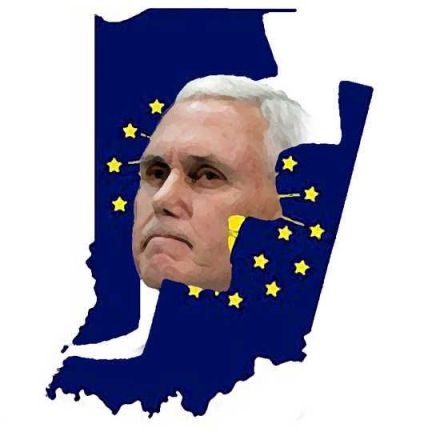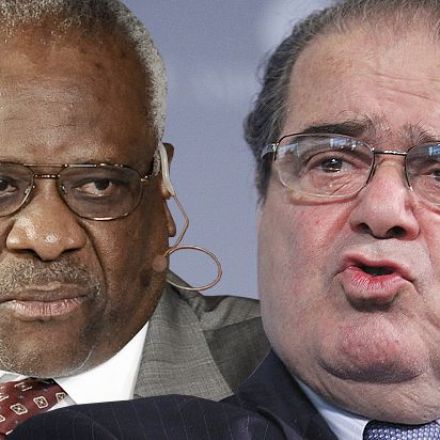Pence and the Indiana Legislature were warned by 30 expert law professors
I'll get straight to the point. Pence and the Indiana Legislature were warned - in advance - that this RFRA was very different than the ones passed in other states. ...
Continue ReadingWhen Reason Seems to Fail
"I told you so" is cold comfort to taxpayers facing years of expensive legislation, waves of mutual spite and the social and economic consequences of intentional intolerance.
These outcomes were predicted and were easily predictable. Nor can I see how the legal analysis that I know the Legislature had to review could be dismissed as being politically motivated.
The dKos article makes me wonder aloud what outcome the Social Conservative backers of this bill expected it to achieve, since it's not reasonable to assume they are all complete idiots. But the further reading you see linked below has not helped. I'm simply baffled on a deeper and more comprehensive level.
Gov. Pence and the members of the Indiana Legislature who voted for this bill cannot all be idiots and regardless, they are all politicians. I find it hard to understand the complete failure to anticipate the overwhelming - and expensive - public reaction to this bill. I assume they expected widespread public support, at least a plurality of support - or they would not have supported it.
I have some suspicions, some speculations. I'm concerned that this somehow ties into the religious "Dominion Movement." I am certain that it influences some, but I am unwilling to stretch to the conclusion that it is the primary motivator and I've as yet seen no current, well-documented insight into that movement's involvement in this particular initiative.
Please feel free to add sources and reactions that shed light on this; in particular, anything from conservative sources that might speak to intended outcomes.
-
Analysis of the Indiana RFRA
Various perspectives on the legal landscape created by the Indiana RFRA. This is a social list, please add any perspectives you find.
Add List item-
1 +110y+ ago by Graphictruth
Letter to Indiana Legislature Concerning Pending "Religious Freedom Restoration Act" Bills
Letter drafted by The Public Rights / Private Conscience Project at Columbia Law School.
The Public Rights / Private Conscience Project engages in policy work on a wide range of religious exemption issues.
Sent to the legislature prior to the vote, reputedly by the request of an unnamed member. (See story.)
- 10y+ ago by Graphictruth
-
3 +110y+ ago by Graphictruth
A Pagan Lawyer’s Take on Indiana’s “Religious Right to Discriminate Law”
Protected discrimination theoretically includes not only discrimination on the basis of sexual orientation, but also discrimination against those of other religions, and so could affect out-of-the-closet Pagans in the Hoosier state, as well.
-
4 +110y+ ago by Graphictruth
ACLU Testimony re: SB 101 and SB 568 – Indiana’s “Religious Freedom Restoration Act” (RFRA) Indiana Senate Judiciary Committee February 9, 2015 [PDF]
Beyond being potentially harmful, this legislation is unnecessary. Government in Indiana, in the wake of marriage equality, has not been on a rampage, stomping on individuals’ religious liberties. If such were the case, the ACLU would be the first to defend, for example, a church from any attempt by government to dictate religious rituals or acts. This legislation, as we have said, is a solution in search of a problem.
-
5 +110y+ ago by Graphictruth
Why Indiana's Religious Freedom Law Is Such A Big Deal
Huffington Post plain language discussion of context and potential consequences.
...intention is one thing, impact quite another. As legal experts pointed out to The Huffington Post, even with the Indiana law in place, a business owner refusing service to a same-sex couple might still lose a discrimination lawsuit. It would depend on several factors -- among them how the judge interpreted phrases like “compelling interest” and “substantial burden.” The outcome could also depend on whether the alleged discrimination took place in a city that has its own laws making such discrimination illegal.
-
6 +110y+ ago by Graphictruth
Gay Rights, Religious Accommodations, and the Purposes of Antidiscrimination Law - Andrew Koppelman
Northwestern University School of Law February 16, 2014
Abstract:
Religious conservatives feel that it would be sinful for them to personally facilitate same-sex marriages, and they have sought to amend the laws to accommodate their objections. These efforts have been fiercely resisted. The resistance is largely unnecessary. Gay rights advocates have misconceived the tort of discrimination as a particularized injury to the person rather than the artifact of social engineering that it really is. Religious conservatives likewise have failed to grasp the purposes of antidiscrimination law, and so have demanded accommodations that would be massively overbroad. If those purposes are carefully disaggregated, the result is different from what advocates on either side have demanded.
This issue exposes a major flaw in progressive thought, one that entrenches the very inequalities the left seeks to combat. The individual-injury-based conception of antidiscrimination law has not only produced excessively harsh treatment of religious conservatives. It has entrenched racial and gender subordination, by imagining discrimination to be the conduct of a few bad actors rather than a structural wrong that demands structural remedies.
34 page PDF, free download.
-
7 +110y+ ago by Graphictruth
The Controversy in Indiana Is Trumped Up—but RFRA Isn’t a Good Law
Andrew C. McCarthy | The National Review
Trumped up controversies like the one in Indiana are needlessly divisive. There would be many more Americans supportive of, or at least resigned to, the concept of gay marriage if it were just a matter of live-and-let-live tolerance. Instead, the Left’s agitators have made it the leading edge in a campaign to suppress traditional religious belief. They demand not toleration but compulsory approbation — with dissenters stigmatized and subjected to the prohibitive expense of legal fees.
-
8 +110y+ ago by Graphictruth
Indiana governor says he didn’t anticipate ‘the hostility that’s been directed at our state’
But state Rep. Ed DeLaney, an Indianapolis Democrat, said Indiana’s law goes further and opens the door to discrimination.
“This law does not openly allow discrimination, no, but what it does is create a road map, a path to discrimination,” he told the large, boisterous crowd that gathered outside of the Statehouse on Saturday.
“Indiana’s version of this law is not the same as that in other states. It adds all kinds of new stuff and it moves us further down the road to discrimination,” said DeLaney.
-
9 +110y+ ago by Graphictruth
Yes, Indiana’s ‘religious freedom’ law could promote discrimination
RFRA instructs courts to treat government actions that infringe on people’s religious practices with the highest legal scrutiny. Few government actions can survive that sort of review — including, perhaps, the application of municipal laws barring discrimination against gays and lesbians. That’s why RFRA supporters claim the law ensures that, say, devout Christian florists won’t have to provide their services in a same-sex wedding. If a local anti-discrimination ordinance required those florists to service a ceremony to which they objected on religious grounds, they could challenge the application of that ordinance in court, and the legal balancing that RFRA demands would tip the scales more in their direction.
-
-
19 states that have ‘religious freedom’ laws like Indiana’s that no one is boycotting [Enhanced snap with discussion]





























Join the Discussion